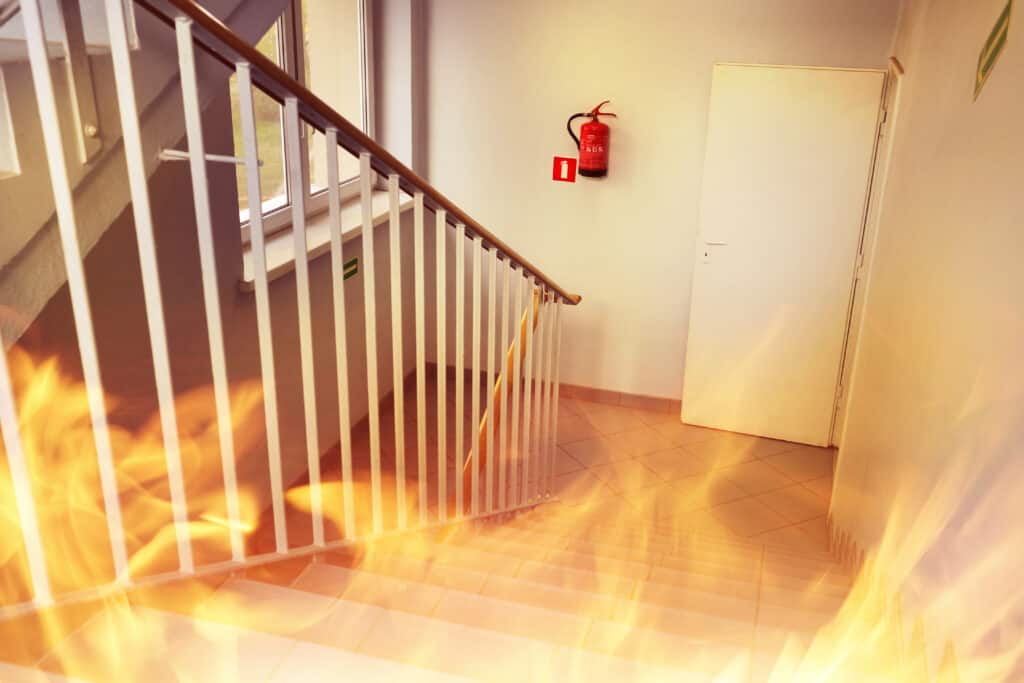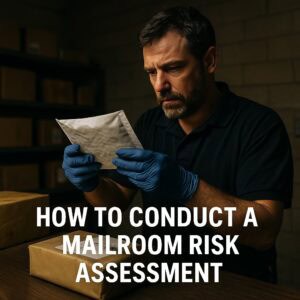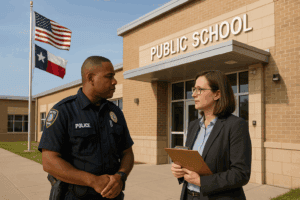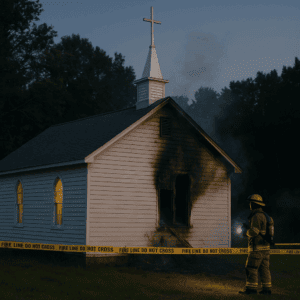Hotel safety abroad is a crucial aspect to consider while traveling, and one of the most important safety concerns is the risk of fires. Many hotels outside the United States may not have the same fire-resistant standards, which could result in flammable interior materials, limited access to escape routes, and inadequate firefighting equipment. As a traveler, it is essential to take responsibility for your safety and that of your family by having a contingency plan in place and being vigilant about potential hazards.
Choosing a Safe Hotel
When traveling abroad, it is essential to prioritize your safety, particularly when it comes to fire hazards in hotels. To ensure a secure stay, consider opting for a modern hotel, preferably part of a well-known U.S. chain, as they usually adhere to higher safety standards. Moreover, they are likely to have better fire-resistant materials and fire prevention systems in place to minimize risks.
Booking a room on a lower floor, such as the second or third, can be advantageous in case of a fire. This allows you to jump to safety if necessary, as most fire departments can typically reach above the second floor but might not be able to access your side of the building promptly.
Be proactive upon checking in – locate exits and stairways, and ensure the doors open. Count the number of doors between your room and the nearest exit or stairway to help you navigate during an emergency. Familiarizing yourself with fire alarms and knowing how to use them is equally important.
Checking the functionality of smoke detectors in your room is a vital step. If it does not work, request for it to be fixed or change rooms. Carrying a portable smoke detector can be beneficial as an added safety measure in locations with heightened concern. Place it by the hall door near the ceiling, and don’t forget to remove the battery while traveling.
With regards to room windows, ensure they open and you understand how the latches work. Familiarize yourself with any external structures, such as ledges or decks, which could aid your escape. Having a flashlight handy in your room, along with the room key, can be an essential asset in a fire emergency.
By choosing a safe hotel and taking fire precautions seriously, you can significantly reduce the risks associated with hotel fires while traveling abroad. Maintaining a calm, prepared mindset with a well-planned contingency will ensure the safety of you and your family in the event of an emergency.
Factors to Consider Upon Check-In
Room Location
When checking into a hotel, opt for the most modern establishment, ideally a U.S. chain. Request a room on a lower floor, preferably the second or third. Having a room no higher than the second floor increases the likelihood of a safe escape, in case jumping becomes necessary. Fire departments may not reach you in time, or position a fire truck on your side of the building.
Exit and Stairways
As soon as you check in, locate the exits and stairways, ensuring the doors open. Count the number of doors between your room and the exit or stairway, as a smoke-filled hallway might require “feeling” your way to an exit. Mentally map your escape route to act calmly if a fire occurs.
Fire Alarm System
If the hotel has a fire alarm system, locate the nearest alarm and familiarise yourself with its operation. It’s important to know how to activate it, even in dark or smoke-filled conditions.
Smoke Detectors
Inspect the smoke detector in your room by pushing the test button. If it doesn’t work, request maintenance or move to another room. As a precaution, you can carry your own portable smoke detector (with the battery removed while traveling) and place it near the ceiling by the door. Ensure your room windows open, and understand how the latches work. Look outside to mentally rehearse your escape through the window, taking note of any ledges or decks that could help with a safe evacuation. Lastly, keep the room key and a flashlight easily accessible in case of an emergency.
In-Room Fire Prevention Measures
Cooking and Kitchen Safety
Proper cooking and kitchen safety measures help reduce the risk of fires in hotel rooms. Keep cooking appliances and combustible materials away from flammable objects and clothing. Avoid leaving cooking unattended and always turn off appliances when not in use. If a hotel room includes a kitchen, make sure all electrical appliances are in good condition and properly plugged.
Smoke Alarms and Fire Alarms Maintenance
Regular maintenance and testing of smoke alarms and fire alarms ensure they work efficiently and effectively when needed. Smoke alarms should be tested monthly, and batteries should be replaced as required.
Hotel staff should conduct routine inspections of smoke detectors and fire alarms to ensure proper functionality. You should also take responsibility by testing the smoke detector in your room upon arrival to make sure it is working correctly.
Hotel Fire Statistics and Causes
According to recent data, an estimated 3,900 hotel and motel fires are reported to U.S. fire departments each year, causing approximately 15 deaths, 150 injuries, and $76 million in property damage. These figures emphasize the importance of fire safety precautions in the hospitality industry, particularly for structures that may lack advanced fire prevention systems.
One of the primary causes of hotel fires is electrical malfunctions, which account for 24% of non-confined fires that extend beyond the room of origin. Structure fires in hotels and motels represent 1% of all structure fires in the United States. Addressing these issues can significantly reduce the risk of fires, thereby preserving lives and property.
Additionally, there are several other contributing factors known to increase the chances of fires in hotels. Cooking equipment, smoking materials, and clothes dryers are among the common culprits. Ensuring proper maintenance of these items and adhering to fire safety guidelines can notably minimize the likelihood of fire incidents.
While these statistics and causes are based primarily on data from the United States, hotel fires can pose a significant risk abroad, where fire safety systems and regulations may not always be as strict or advanced. Staying vigilant, well-informed, and prepared for potential fire hazards is crucial for the safety and well-being of hotel guests and staff, regardless of their location.
Developing an Evacuation Plan
When staying at a hotel abroad, it is essential to have a well-thought-out evacuation plan in case of a fire. Since many hotels abroad may not have the same level of fire safety measures as those in the United States, it is crucial to be proactive in ensuring your safety and that of your family.
Upon arrival at the hotel, take the time to familiarize yourself with the exits and stairways. Make sure the doors can be opened, and count the number of doors between your room and the exit or stairway. This will be helpful in case you need to navigate through a smoke-filled hallway. Also, locate the nearest fire alarm and learn how to use it.
In your hotel room, ensure the window can be opened and familiarize yourself with the latches. Pay attention to any ledges or decks that can aid in your escape. Test the smoke detector in your room; if it doesn’t work, request a repair or change rooms. Carrying a portable smoke detector is also a good idea, placing it near the ceiling by the hall door.
Keep both the room key and a flashlight by your bedside, as these will be invaluable during an evacuation. In the event of a fire, wet towels can be used to block smoke from entering the room through gaps around the door. Additionally, if you need to escape through a window, get a blanket or towel wet to help avoid burns from heated surfaces.
Remember to always discuss your evacuation plan with your travel companions and practice it together. Having a clear and well-rehearsed plan can significantly increase the likelihood of a successful escape in case of a hotel fire abroad.
Frequently Asked Questions
What are some precautions for hotel fire safety abroad?
Select a quality hotel chain, if possible. Ensure that there are adequate escape routes, easily accessible exits, and functioning firefighting equipment in the hotel. Inspect smoke detector functionality and, if possible, bring a portable smoke detector for added precaution.
How can you create a contingency plan for hotel fires?
Creating a contingency plan involves discussing fire safety measures and escape plans with your family or travel companions. Familiarize yourself with emergency exits, stairways, and fire alarm systems as soon as you check-in. Form a mental map of escape routes and ensure everyone in your group knows the plan.
What factors should be considered when choosing a hotel for fire safety?
Consider selecting a modern hotel or a reputable U.S. chain, as they are more likely to have better fire-resistant construction and safety measures. Request a lower floor, preferably the second or third, to increase the chances of escaping a fire more quickly. Make sure the hotel has proper smoke detectors, firefighting equipment, and clearly marked exit routes.
What steps should be taken upon hotel check-in to ensure fire safety?
Upon hotel check-in, locate exits and stairways and ensure exit doors open. Count the doors between your room and the exit/stairway and remember them for potential low-visibility situations. Familiarize yourself with the fire alarm system and learn how to activate it. Check if your room’s smoke detector is functioning or use a portable one if necessary.
How can you safely evacuate during a hotel fire?
If a hotel fire occurs, stay low to the ground to avoid smoke inhalation, and follow your planned escape route. Do not use elevators during a fire; utilize stairs and emergency exits. Keep calm and evacuate as quickly as possible, assisting anyone who might need help.
What actions should be taken if trapped in a hotel room during a fire?
If trapped in your hotel room during a fire, stay low and cover any vents and gaps around the door with wet towels to prevent smoke from entering. Close the windows, but do not lock them, and disable any air conditioners or heaters. Call for help and signal your location using a flashlight or any available means. If possible, fill your bathtub or sink with water to soak towels or clothing for protection against smoke and flames.






